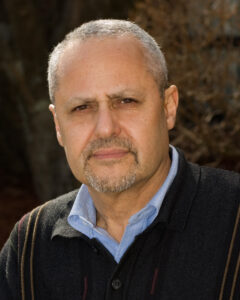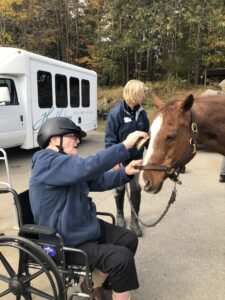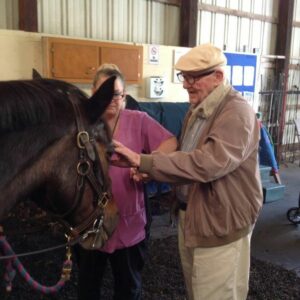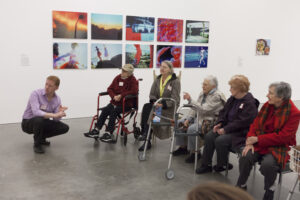By Susan Gonsalves, Contributing Writer

WINCHESTER – In the news, dementia is typically presented as a disease that robs you of yourself and makes you fail to recognize your children and other loved ones. It is mired in decline and despair.
“This is not a valid view of Alzheimer’s and dementia,” said John Zeisel, author of “I’m Still Here: A New Philosophy of Alzheimer’s Care.”
“They are always with us until the end of their lives,” he said.
A different kind of care and treatment approach

Zeisel established the “I’m Still Here” approach to non-pharmacological care and treatment of memory loss—designed to manage and lower rates of anxiety, aggression, apathy and agitation. In 1996, he created a foundation to develop family and community programs and activities that embrace the ISH philosophy and its guiding principles.
An equine therapy program at Windrush Farm in North Andover is one recent program. Participants with dementia start off by getting to know a horse, recognize its name and distinguish it from another, Zeisel explained. From there, they begin to care for “their” animal—brushing it and learning how to put a saddle on and blanket with assistance. Then, they offer their horse for a young person with a disability to ride.

“They participate and they are still there,” Zeisel said. “When engaged in something meaningful to them, they wake up, they remember things and they recognize people.” Zeisel recalled seeing a man rise from his wheelchair in order to brush `his’ horse.
He was also present when participants with dementia were learning how to walk their horses. Zeisel put his arm out to assist a woman and she told him, “I can walk.”
“She didn’t want any help. She was proud and self-reliant,” he noted. “The world needs to have more of these programs. They need to have programs that give people back to themselves,” said Zeisel.
A variety of initiatives

Over the past decade, many of their initiatives have expanded significantly. Their Meet Me at the Museum program, for example, started at the Museum of Modern Art in New York City and was adopted by museums in California, Nebraska, Europe and Asia. Zeisel explained that the similar Meet Me at the Movies program, established in Boston is now used by organizations in Seattle and Paris, France, to name a couple. He noted the program uses snippets of films featuring iconic actors and scenes with which the people with dementia are able to connect.
Music is another avenue that reaches people living with the conditions. To wake people up in the morning, a quiet tune plays, building up to a faster, more exciting piece and then subsiding down again, Zeisel explained. Movement to music and participation with objects in their hands like rubber balls, rattles and drum sticks proves to be effective.

Jerry Pucillo, president of the I’m Still Here Foundation board, has first-hand knowledge in this area; his step-mother at age 72, developed Alzheimer’s. Pucillo, who shared a Harvard fellowship with Zeisel, has 30 plus years of experience in real estate development and project management—delivering 1,000 units of senior housing into the marketplace and recently focusing on assisted living communities.
“Music is one of the things that stays with people,” he said. “My stepmom could sing along with songs she knew for years.”
He joined the organization, he said, because he recognized the importance and effectiveness of Zeisel’s work.
Shifting focus
Like other organizations, the pandemic brought in-person activities to a halt.
The foundation has shifted gears. Thanks to a $100,000 grant over three years from the Cummings Foundation, I’m Still Here launched its innovation grant program, extending an invitation to care partners, families, private and community groups to create their own programs to benefit people living with dementia.
“The ISH principles are tried and true and we’re now expanding our reach and giving program managers at various facilities the ability to create more opportunities for people outside in the communities,” Pucillo said.
Innovative Grants Program awards in 2021 went to the Man’s Best Friend Innovative Community Engagement Program at Poydras Homes, Dementia Friend Specialized Virtual Exercise Classes in the town of Arlington, the Community Social Connections Program at Martha’s Vineyard Center for Living, and Art is… In, at the Memory Center of the University of Chicago Medicine and GoldMind Arts and Aging.
More information on the grants and organization can be found at https://www.imstillhere.org/.












